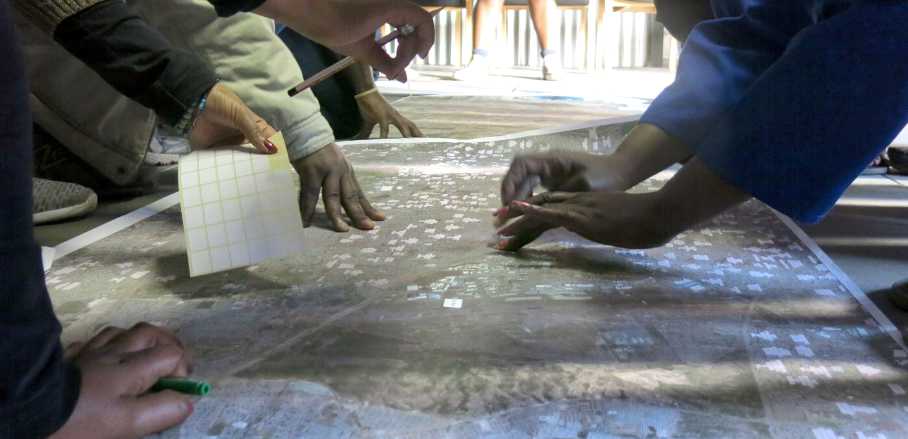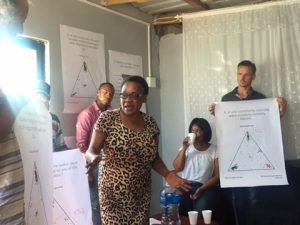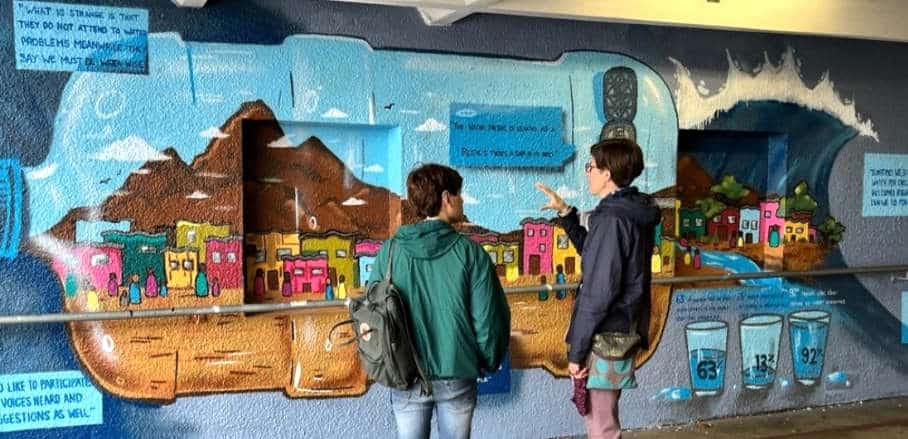Local Wisdom, Global Impact: The Cape Town Water Project
Community-level capacity building and knowledge co-creation are key to resilience and justice. Join Gina Ziervogel as she takes us to explore the Cape Town Water Project.
Across the world, calls for transformative adaptation in the face of climate change grow louder and more insistent. It is recognised as fundamental in achieving climate and sustainability goals – such as those set in the United Nations Framework Convention on Climate Change (UNFCCC) and the Sustainable Development Goals.
In the context of climate change, transformative adaptation refers not only to reducing climate risk but also addresses issues of social justice and the root causes of these risks.
Climate adaptation efforts are often most effective when carried out at the local level. Therefore, it is essential to both build communities’ capacity to adapt and to ensure that local perspectives are acknowledged and integrated into higher-level adaptation measures. For example, when considering adaptation to flood risk in a city, it is essential to have a deep understanding of the lived reality of residents in flood plains. This understanding is central to the development of appropriate and effective adaptation solutions
Empowering Low-Income Communities: The Cape Town Water Project
In order to explore water service issues and potential adaptation options in low-income urban settlements in Cape Town, South Africa, a group of academics and community activists got together. By using a transdisciplinary approach, the project aimed to meet the needs of a local social movement, the Western Cape Water Caucus.

Collaborative mapping process to understand climate hazards and their impacts in low-income settlements © GIna Ziervogel
The Western Cape Water caucus is seeking more robust evidence to support its arguments and actions when interacting with City of Cape Town officials and others around water-related issues in low-income areas.
Many of the caucus members have been actively working to help their fellow residents in addressing a multitude of pressing water-related concerns. These concerns range from high water bills to overflowing sewerage, water management devices that limit their daily water allocation, and concerns about how to resolve water issues.

Community researcher sharing her group’s story in the workshop. © Gina Ziervogel
The project used a data collection tool called SenseMaker (Lynam, T., and C. Fletcher. 2015. Sensemaking: A complexity perspective. Ecology and Society 20). This approach requires the research team to develop an initial prompting question to elicit a short story from a respondent. Subsequently, a series of follow-up questions are posed to let the respondent ‘self-signify’ their story, to clarify what it means to them.
The answers to the questions, developed in a four-day workshop, were then collected by caucus members on paper or via a smartphone app.
From Narratives to Action: Addressing Cape Town’s Water Issues
A total of 311 responses were collected, compromising both short narratives and quantitative data related to addressing water issues in their community. Following this, several workshops were held to interpret and reflect on how to use the data and give feedback to the communities as well as to City of Cape Town officials. A collaborative effort between activists and academics was instrumental in sharing both the qualitative stories and the compelling quantitative evidence.
As outlined in a paper related to the project, the most frequently recurring issues that emerged were about bills and pricing, water management devices, and leakages. Residents expressed a lot of frustration around battling to resolve issues and not getting help from the City officials. As one resident expressed, “My problem is a drain leaking inside my yard. My house has been built on top of a pipe, so I have to demolish my house in order to solve the problem. I went to the Housing Department and they told me that it’s not their problem.”
Community Empowerment: A Key to Policy Involvement
Since 1992, the UNFCCC has increasingly focused on capacity building, particularly to assist developing countries that request support. One need that is often stressed is capacity building at a community level. Thus far, capacity-building efforts within the UNFCCC framework have mostly been ad hoc, highlighting the crucial need for international support for capacity-building that is long term.

Western Cape Caucus members presenting the findings to the local community. © Gina Ziervogel
The SenseMaker process strengthened relationships between the City of Cape Town and the Water Caucus. This collaboration has subsequently resulted in the increased engagement of the Caucus in city-wide policy and planning activities. As one city official said: “I actually came out of [the workshop] on a high. It was such a good encounter, such a positive encounter. I felt that the way the community expressed themselves was clear but not attacking. That was really positive for me.” Similarly, it was an important project from the activists’ point of view, with one of them saying: “In the past, we had heard stories but they weren’t documented. But now we have them documented so can use them to support our advocacy.”
Building Solutions Together: The Power of Co-Creation
Empowering communities and enhancing solutions through the co-creation of knowledge has emerged as a pivotal strategy for supporting locally-led adaptation. As part of this, it is necessary to shift from a top-down transfer of existing knowledge to embracing social learning and the co-creation of contextual understandings of how best to bring about change. If learning can be locally grounded and drawn from a broad set of knowledge systems, it can inform measures that support transformative adaptation and in turn empower communities, as outlined in this paper emerging from the project. Learning methods can take various forms, from structured, formal systems to informal, community-driven processes. In any case, they will be most effective when networks of trust in the community have been built up over time.
The SenseMaker project illuminated how co-produced knowledge can foster a deeper, empathetic understanding of the challenges faced by individuals and organisations. This approach, as opposed to blaming and finger-pointing, paves the way to empowering stakeholders to better adapt to climate risk and water stress.
The findings suggest that community-level capacity building has the potential to provide some of the tools to better adapt to climate risk and water service issues. This type of capacity-building effort can better confront inequalities and power dynamics because of the opportunities to acknowledge and engage with locally relevant knowledge and knowledge systems. Such a transdisciplinary community-level project also offers valuable lessons for adaptation policy.
Improving Equity and Justice in Adaptation Policy
Furthermore, enhancing equity and justice within adaptation policy is a pressing concern. Targeted policy support that encourages the co-creation of knowledge at the community level could enable more widespread, transformative capacity building, a critical component of adaptation policy that aims to strengthen social justice.
Approaches that co-create knowledge can help to legitimise the knowledge of marginalised stakeholders. If this bottom-up knowledge is shared appropriately it can give marginalised groups a ‘seat at the table’ for policy-level discussions, such as how to develop future water sources. Consequently, it empowers local perspectives to shape higher-level adaptation measures, effectively addressing both equity and justice issues alongside the overarching challenge of climate risk.
The original version of this article was first published by CDKN
- Local Wisdom, Global Impact: The Cape Town Water Project - 2. November 2023
